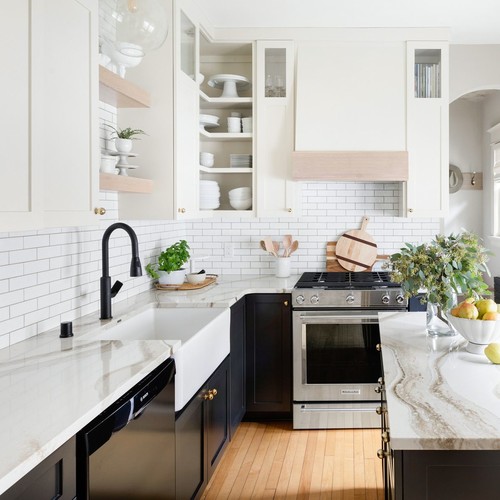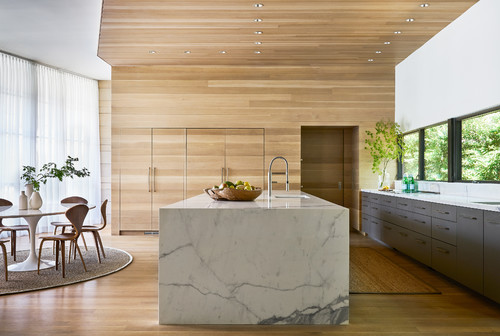
alabn/iStock
For many of us, the kitchen is the hub of activity. It is where meals are made—and sometimes eaten—and functions as a gathering spot for family and friends. So as the epicenter of so much action, your kitchen deserves to be functional and stylish—and that all starts with your countertops.
Lately, the countertop surface that’s on the lips and wish lists of designers and home buyers alike is quartz. But before we clue you in on why it’s our current favorite kitchen surface, let’s look at the facts.
“Quartz is a natural material that bears a resemblance to marble—you’ll get variation and veins, aka the stuff that makes people oooh and aah—but with much more durability,” says Jessica Geller of Toledo Geller Interiors, in Englewood, NJ.
But while marble or granite is simply cut from the earth, quartz countertops are engineered slabs made of approximately 90% ground natural quartz fused with polymer resins and pigments.
The average price is around $50 to over $70 per square foot (not including installation), and the actual price you pay depends on the brand, region, design, finish, thickness, and edge profile.
Quartz can be sourced from a number of places: kitchen design showrooms, stores such as Ikea or the Home Depot, and local stone yards that handle their own fabrication and installation.
Contemplating quartz for your kitchen? Here are some reasons to consider this dazzling countertop surface.
It’s extremely durable
Quartz is one of the hardest minerals on Earth—even harder than granite or marble. It’ll last as long as your kitchen, and many quartz countertop manufacturers provide warranties ranging from 10 to 15 years to a lifetime. It is also scratch-resistant and won’t crack or chip.
Geller says quartz can withstand heat fairly well. However, experts warn to avoid placing hot pots and pans from the stove or oven directly onto the countertop.
It’s nonporous and antibacterial
Quartz isn’t porous like other stone surfaces, which means it never needs to be sealed. It’s resistant to mold, stain, and mildew, and a quick daily wipe-down keeps it 99.9% bacteria-free. Generally, warm, soapy water will clean kitchen work surfaces.
Summer Kath, executive vice president of design and business development at Cambria, says other natural stone surfaces like granite and marble require regular sealing and polishing, but quartz is much less high-maintenance.
It’s environmentally friendly
Good news for those of us looking to live greener: Quartz materials typically leave less of a carbon footprint than other countertops. It’s an abundant material in the Earth’s crust, and the finished product is nontoxic and nonallergenic.
Quartz manufactured by Cambria and Caesarstone is Greenguard Certified, which means it doesn’t emit harmful compounds into the air.
“It is a flexible product that can be used beyond countertops, including wainscots and wall bases, service counters, backsplashes, tables, and more,” says Maggie Amir, director of public relations for Caesarstone USA in Richmond Hill, GA.
There are unlimited color and pattern options
Quartz can be manufactured in more color options than natural stones like marble or granite. It comes in a wide variety of colors and patterns, including white, cream, brown, and black, with sparkles, swirls, flecks, and veining for the look of granite or marble. You can get it honed, sandblasted, or embossed. Even something as outlandish as, say, a strawberry-red countertop can probably be done.
“Quartz combines the best qualities of countertop choices with the appeal of natural veining and coloration and the durability to make it a solid financial choice,” says Geller.
The post Quartz Kitchen Countertops Have Captured Our Hearts—Here’s Why appeared first on Real Estate News & Insights | realtor.com®.




No comments:
Post a Comment